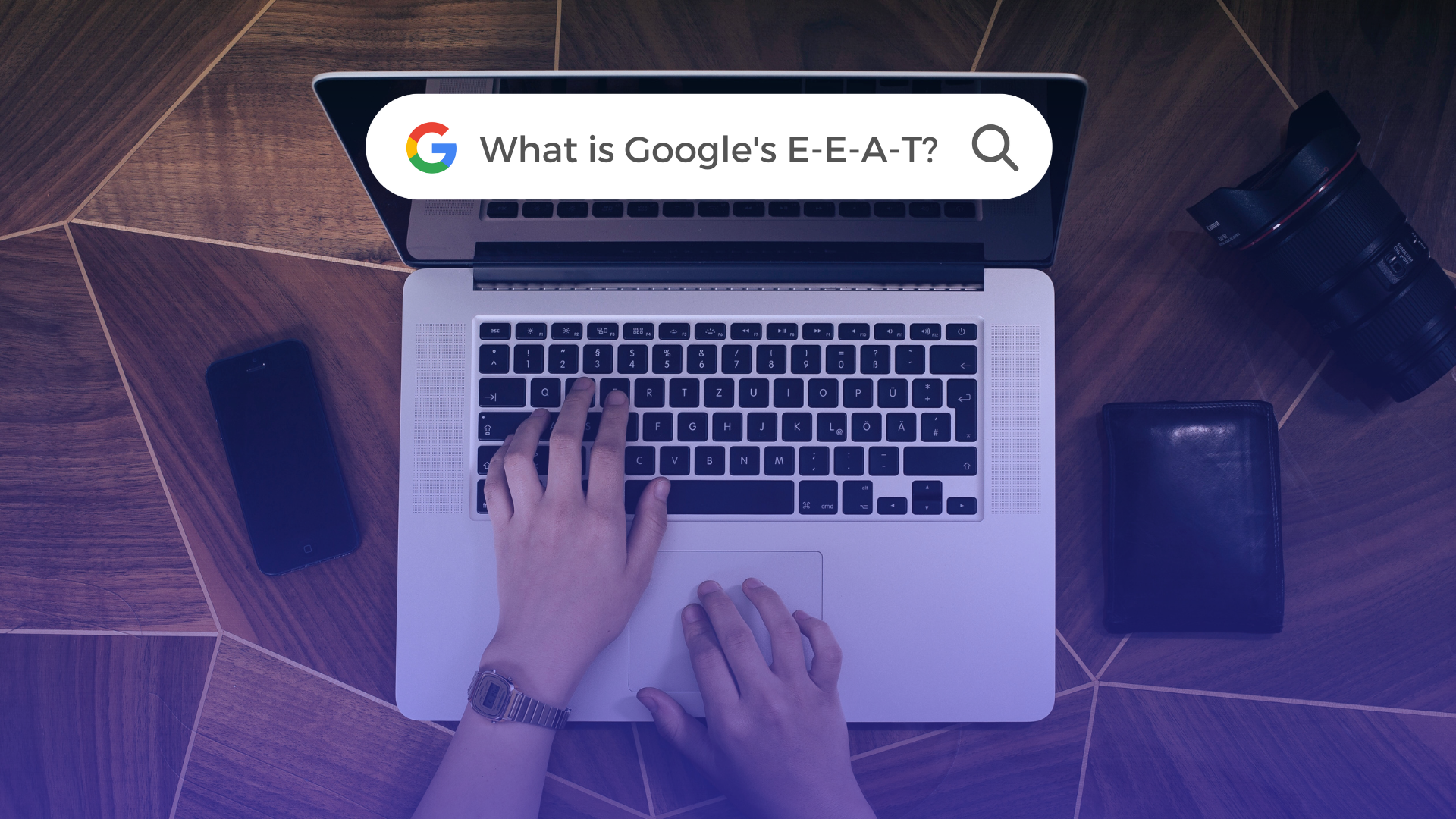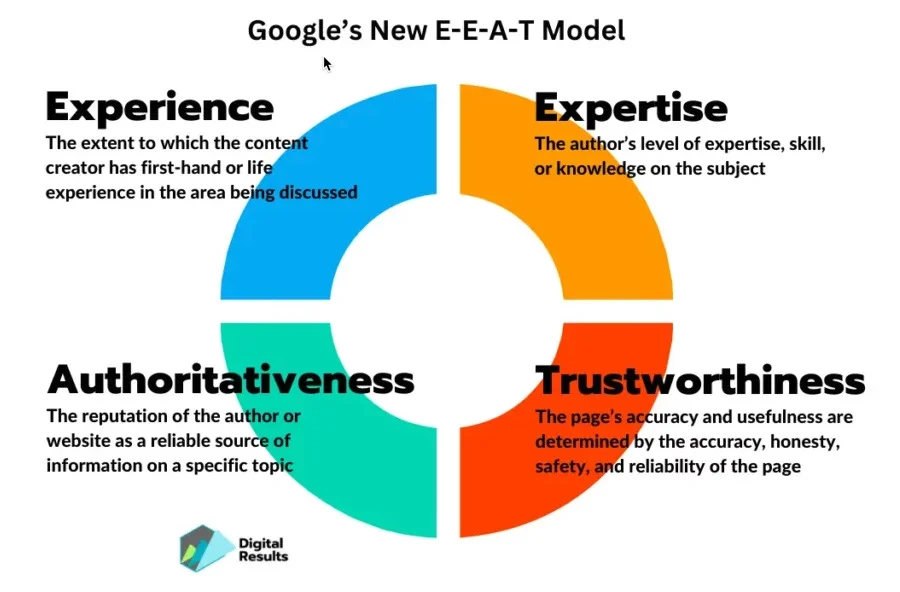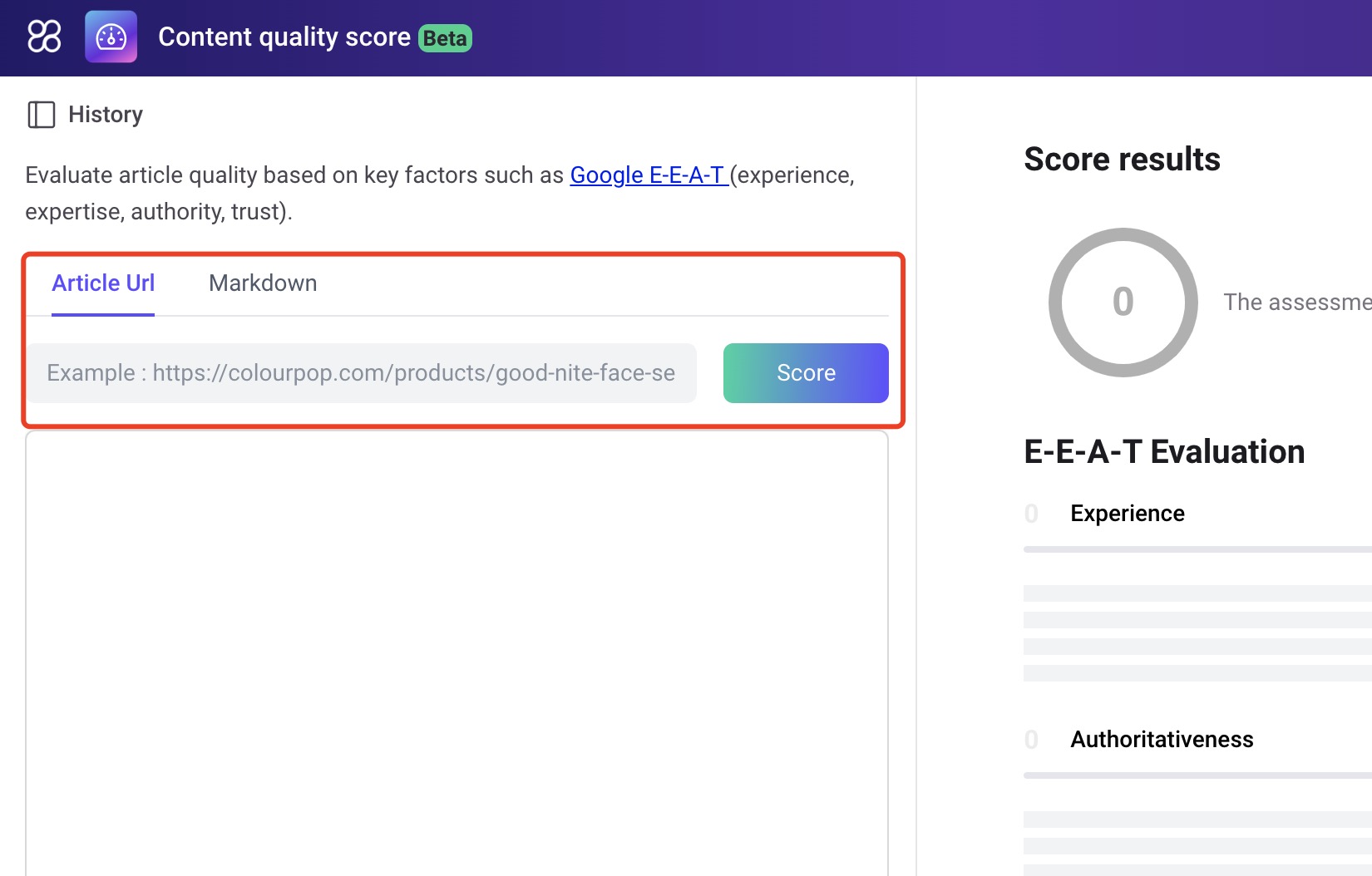What is E-E-A-T and how Google evaluate content quality by E-E-A-T

Understanding E-E-A-T
What is E-E-A-T?
E-E-A-T stands for Experience, Expertise, Authoritativeness, and Trustworthiness. It is a concept that Google uses to evaluate the quality and credibility of a website's content. In other words, E-E-A-T is a set of criteria that Google uses to determine whether a website can be trusted as a reliable source of information.
Experience refers to the level of knowledge and expertise that the creators of the content have in their respective fields. Expertise relates to the depth and breadth of knowledge in a specific subject area. Authoritativeness pertains to the reputation and authority of the content creators or website within their industry or niche. Trustworthiness involves factors such as transparency, accuracy, and reliability.
Importance of E-E-A-T in SEO
While E-E-A-T is not a direct ranking factor for Google, it plays a crucial role in determining the credibility and value of a website. When users search for information online, they expect accurate and trustworthy results. By evaluating websites based on E-E-A-T principles, Google aims to provide users with high-quality content from reputable sources.
From an SEO perspective, understanding E-E-A-T is essential for developing an effective strategy. Websites that demonstrate strong expertise, authoritativeness, and trustworthiness are more likely to rank higher in search engine results pages (SERPs). This means that optimizing your website's E-E-A-T can lead to increased visibility, organic traffic, and ultimately better conversions.
To improve your website's E-E-A-T, you need to focus on creating high-quality content that showcases your expertise in your field. This involves providing accurate information backed by credible sources and demonstrating transparency about who you are as an organization or individual behind the content.
Additionally, building relationships with authoritative figures or organizations within your industry can help boost your website's credibility. Collaborating with influencers or experts in your field can not only enhance the quality of your content but also increase your chances of being recognized as a trusted source by Google.
Furthermore, user experience plays a significant role in E-E-A-T evaluation. A well-designed and user-friendly website that provides a positive browsing experience can contribute to the perception of trustworthiness. Ensuring that your website is secure, loads quickly, and is easy to navigate are all factors that can positively impact E-E-A-T.
Factors, Features, and Signals in E-E-A-T Evaluation
Factors and Features in E-E-A-T Evaluation
Factors and features play a crucial role in evaluating the Experience, Expertise, Authoritativeness, and Trustworthiness (E-E-A-T) of a website's content. These factors are chosen by humans and contribute to the overall predictions of the evaluation model used by Google.
Experience: The experience factor assesses the level of knowledge and expertise that the content creators possess. It takes into account their qualifications, credentials, and professional background. Websites with experienced authors are more likely to be considered reliable sources of information.
Expertise: Expertise refers to the depth and breadth of knowledge in a specific subject area. Content that demonstrates expertise provides valuable insights, detailed analysis, and accurate information. Google evaluates expertise based on the quality of content produced by authors over time.
Authoritativeness: Authoritativeness focuses on the reputation and authority of both individual authors and websites as a whole. Websites that have established themselves as trustworthy sources within their industry or niche are considered authoritative. This can be achieved through consistent delivery of high-quality content, recognition from other reputable sources, citations, backlinks, and positive user feedback.
Trustworthiness: Trustworthiness is an essential factor in evaluating content quality. Users expect accurate information from reliable sources. Websites that demonstrate transparency about their purpose, provide references or citations for claims made in their content, have clear contact information or an "About Us" page build trust with users.
These factors collectively contribute to assessing the overall E-E-A-T of a website's content.
Signals in E-E-A-T Evaluation
While factors and features are chosen by humans during the evaluation process, signals are determined algorithmically by machines. These signals help determine which content demonstrates expertise, authoritativeness, and trustworthiness.

Backlinks: Backlinks are links from other websites that point to your content. When authoritative websites link to your content, it signals to Google that your website is a trusted source. The quality and relevance of these backlinks play a significant role in determining the E-E-A-T of your website.
User Engagement: User engagement metrics, such as click-through rates, time spent on page, bounce rates, and social media shares, provide signals about the quality and relevance of your content. If users find your content valuable and engaging, it indicates that you are providing useful information.
Reviews and Ratings: Reviews and ratings from users or third-party review platforms can influence the perception of trustworthiness. Positive reviews indicate that users have found value in your content or services.
Social Media Presence: Active participation and engagement on social media platforms can help establish credibility and authority within your industry. Sharing valuable content, interacting with followers, and building a community around your brand can contribute to a positive E-E-A-T evaluation.
Website Security: A secure website with an SSL certificate (HTTPS) provides a safer browsing experience for users. Google considers website security as an important signal for trustworthiness.
It's important to note that while these signals are taken into account during the evaluation process, they should not be pursued solely for the purpose of manipulating search rankings. Instead, focus on creating high-quality content that naturally attracts backlinks, user engagement, positive reviews, and social media attention.
By understanding the factors and features involved in E-E-A-T evaluation and paying attention to the signals that indicate expertise, authoritativeness, and trustworthiness, you can improve the overall quality of your website's content and enhance its credibility in the eyes of both users and search engines.
How Google Evaluates Content Quality
Recognizing and Extracting Authors
When it comes to evaluating content quality, Google places significant importance on the source of the content, specifically the author. Recognizing and extracting authors from unstructured content is a crucial step in determining the credibility and expertise associated with the information provided.
Google employs advanced machine learning and language models to identify authors within web pages or articles. These models analyze various factors such as writing style, language patterns, author bylines, and other textual cues to attribute content to specific individuals or entities.
Factors for Rating Authors
Once authors are recognized and extracted, Google considers several factors when rating their expertise, authoritativeness, and trustworthiness. These factors help determine the overall quality of an author's content and their reputation within their respective fields.
Content Quality: Google assesses the overall quality of an author's content by analyzing factors such as accuracy, depth of research, clarity of writing, and relevance to the intended audience. High-quality content that provides valuable insights is more likely to be considered authoritative.
References: References or citations from reputable sources within an author's content can contribute to their credibility. When an author includes references that support their claims or provide additional context, it demonstrates a commitment to accuracy and thorough research.
Co-occurrences: The presence of an author's name in relation to relevant search queries or other authoritative sources can also influence their rating. If an author is frequently mentioned alongside respected industry figures or cited in reputable publications, it adds weight to their authority.
Reputation Scores: Reputation scores based on user feedback or expert evaluations may be taken into account when assessing an author's credibility. Positive reviews from users who have found value in an author's content can enhance their reputation score.
Credibility Factors: Additional credibility factors such as academic qualifications, professional experience, awards or recognition within a specific field can contribute to an author's rating.
These factors collectively help Google evaluate the expertise and authority of authors responsible for creating online content.
Assigning Content to Authors
To algorithmically apply E-E-A-T principles at scale, Google uses techniques like author vectors and document embeddings to compare and attribute specific pieces of content to individual authors. By analyzing patterns across multiple articles written by the same author, Google can gain insights into their expertise level and evaluate them accordingly.
Assigning content accurately to its respective authors allows Google's algorithms to understand which authors consistently produce high-quality work versus those who may have a less reliable track record. This attribution process helps refine search results by considering not only the relevance of the content but also the reputation and authority associated with its creator.
Evaluating E-E-A-T with Machine Learning
Machine learning plays a vital role in evaluating E-E-A-T by enabling Google's algorithms to recognize entities such as authors more effectively. Machine learning methods allow for improved understanding of context, semantics, relationships between entities, and patterns across vast amounts of data.
By leveraging machine learning techniques along with human-curated factors, features, and signals related to E-E-A-T evaluation criteria, Google continuously refines its ability to assess content quality accurately. This iterative process ensures that search results prioritize reliable sources while minimizing exposure to low-quality or misleading information.
How to Use Quickcreator EEAT Tool to Evaluate Content Quality
Introduction to Quickcreator EEAT Tool
Quickcreator EEAT tool is a powerful tool designed to evaluate content quality based on the principles of Experience, Expertise, Authoritativeness, and Trustworthiness (E-E-A-T). It provides valuable insights and recommendations to improve the credibility and value of your website's content.
As Google increasingly emphasizes E-E-A-T in its evaluation of content, it becomes essential for website owners and creators to understand how their content aligns with these principles. Quickcreator EEAT tool offers a comprehensive solution by analyzing various aspects of your website and providing actionable recommendations for improvement.
Using Quickcreator EEAT Tool
Quickcreator EEAT tool offers a range of features and functionalities that can help you assess and enhance the E-E-A-T of your website's content. Here are some key ways you can utilize the tool:

Content Evaluation: The tool analyzes your existing content to identify areas where improvements can be made. It assesses factors such as accuracy, relevance, depth of research, and overall quality. By identifying weak points in your content, you can make targeted improvements to enhance its E-E-A-T.
Page Transparency: Quickcreator EEAT evaluates the transparency of your web pages by examining elements such as contact information, author bylines, privacy policies, terms of service, and about us pages. It ensures that users have access to important information about your organization or authors, which contributes to trustworthiness.
Building Backlinks and Social Media Presence: The tool provides guidance on building backlinks from authoritative sources within your industry or niche. Backlinks from reputable websites signal authority and expertise to search engines. Additionally, it offers strategies for improving social media presence by engaging with your audience and sharing valuable content.
Getting More Reviews: Positive reviews from satisfied users can significantly boost the credibility of your website. Quickcreator EEAT suggests methods for encouraging user reviews through testimonials or review platforms relevant to your industry. This helps establish trustworthiness by showcasing positive user experiences.
Auditing Existing Content: The tool enables you to conduct a thorough audit of your existing content library. It identifies outdated or inaccurate information that may negatively impact E-E-A-T evaluation. By updating or removing obsolete content, you can maintain a high level of quality across your website.
Improving User Experience: User experience plays an integral role in determining the credibility and value of a website's content. Quickcreator EEAT provides insights into enhancing user experience by optimizing page load times, improving site navigation, ensuring mobile responsiveness, and enhancing overall accessibility.
By utilizing these features offered by Quickcreator EEAT tool effectively, you can systematically evaluate and improve the E-E-A-T factors associated with your website's content.
It is important to note that while tools like Quickcreator EEAT provide valuable guidance for optimizing E-E-A-T factors on your website; they should be used as supplements rather than replacements for creating high-quality content backed by genuine expertise and authority.
Remember that consistently producing accurate information from reputable sources while prioritizing user satisfaction remains crucial in establishing long-term credibility online.
Conclusion
The Importance of E-E-A-T in SEO
In the ever-evolving landscape of search engine optimization (SEO), understanding and implementing strategies related to Experience, Expertise, Authoritativeness, and Trustworthiness (E-E-A-T) is crucial. Google's emphasis on E-E-A-T as a factor in evaluating content quality has significant implications for website owners and creators.
E-E-A-T serves as a critical determinant of the quality and credibility of a website's content. While it may not be a direct ranking factor, it plays a pivotal role in influencing search rankings and overall online presence. Websites that prioritize E-E-A-T principles are more likely to rank higher in search engine results pages (SERPs) and attract organic traffic.
By focusing on E-E-A-T, you can establish your website as a trusted source of information within your industry or niche. Here are some key takeaways regarding the importance of E-E-A-T in SEO:
Credibility and Value: E-E-A-T evaluation ensures that users are presented with accurate, reliable, and valuable content. By prioritizing E-E-A-T principles, you can enhance the credibility of your website and provide value to your audience.
Improved Search Rankings: Websites that demonstrate strong expertise, authoritativeness, and trustworthiness are more likely to rank higher in SERPs. Optimizing your website's E-E-A-T can lead to increased visibility, organic traffic, and improved search rankings.
User Trust: Users rely on search engines to deliver trustworthy information. By aligning with E-E-A-T principles, you build trust with users who seek reliable sources for their queries.
Long-term Sustainability: Prioritizing E-E-A-T fosters long-term sustainability for your website's success. By consistently delivering high-quality content backed by expertise and authority, you establish yourself as a reputable source within your field.
To improve your website's E-E-A-T:
Focus on creating high-quality content that showcases expertise.
Provide accurate information supported by credible sources.
Demonstrate transparency about who you are as an organization or individual behind the content.
Build relationships with authoritative figures or organizations within your industry.
Enhance user experience through well-designed websites that load quickly and are easy to navigate.
Seek backlinks from reputable sources relevant to your industry.
Encourage positive reviews from satisfied users.
It is important to note that optimizing for E-E-A-T should not be approached solely for the purpose of manipulating search rankings but rather as an ethical approach to providing valuable content to users.
See Also
Understanding SEO: A Complete Guide to Search Engine Optimization
Improve Your Search Engine Ranking with These Effective Strategies

